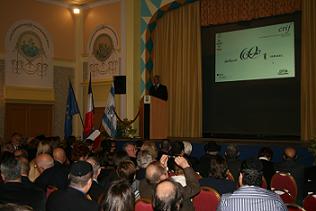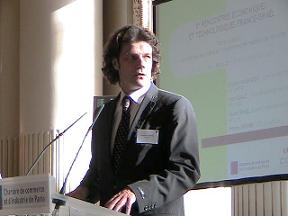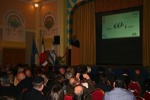 “Lehaïm,” an expression commonly used in Hebrew to toast, actually means “to lives.” It is in reference to this “plurality of existences” that Alain Belhassen, President of CRIF Southeast (Representative Council of Jewish Institutions of France), hosted several conferences at the Beaulieu casino on December 2nd. While reminding that the “Jews are a family of the French Nation and not a community,” and despite his “fierce desire” to mention the long list of threats that continue to weigh on the State of Israel, Alain Belhassen explained that “celebrating the 60 years of the State of Israel’s existence did not imply focusing on political issues” but rather to initiate a new approach “removed from exclusively security stereotypes.” The evening thus offered three conferences aimed at showing how and how much “innovation” has been a main driver for Israel’s “survival” in a hostile environment. Three experts spoke to discuss the “achievements” and “skills” in the fields of medical research and development, agronomy and hydrology, and finally, new technologies. Three specialists whose impressive knowledge coupled with commendable pedagogical qualities for not always easy-to-grasp technical topics, already reveal the success of Israeli companies.
“Lehaïm,” an expression commonly used in Hebrew to toast, actually means “to lives.” It is in reference to this “plurality of existences” that Alain Belhassen, President of CRIF Southeast (Representative Council of Jewish Institutions of France), hosted several conferences at the Beaulieu casino on December 2nd. While reminding that the “Jews are a family of the French Nation and not a community,” and despite his “fierce desire” to mention the long list of threats that continue to weigh on the State of Israel, Alain Belhassen explained that “celebrating the 60 years of the State of Israel’s existence did not imply focusing on political issues” but rather to initiate a new approach “removed from exclusively security stereotypes.” The evening thus offered three conferences aimed at showing how and how much “innovation” has been a main driver for Israel’s “survival” in a hostile environment. Three experts spoke to discuss the “achievements” and “skills” in the fields of medical research and development, agronomy and hydrology, and finally, new technologies. Three specialists whose impressive knowledge coupled with commendable pedagogical qualities for not always easy-to-grasp technical topics, already reveal the success of Israeli companies.

The first speaker, Professor Daniel Benchimol, who divides his obviously busy schedule between the University Hospital and multiple political institutions in Nice, notes that Israel is “the country with the record number of university graduates relative to population.” In the medical field, he explains, the Franco-Israeli meeting has been mutually beneficial: the excellence of the French health system—recognized by the UN, as the speaker notes—against the excellence of medical research in Israel. Sure, the Dean of the Faculty of Medicine in Nice lamented the lack of “institutional relations,” despite Israel’s “world leader” position in medical imaging and significant research advances in embryonic stem cells and medical simulation. According to him, “political reasons” and “linguistic obstacles” have often impeded the development of these relations. Highlighting the new dynamics underway, he reminded that he himself had initiated a “very proactive policy of the Faculty of Medicine and the University Hospital,” leading notably to the signing of two agreements with the Hebrew University of Jerusalem and the Hadassah hospital.

With a more environmental tone, Michaël Bar Zvi’s intervention, General Delegate of a regional NGO on sustainable development (KKL), focused on hydrology issues. Two-thirds of the State of Israel is desert, but innovation, research, and perseverance have again conquered natural elements: over 200 million trees, the officer specifies, have been planted in the Yatir forest, located north of the Negev desert, thanks to the work of KKL, the only NGO recognized by the United Nations in the region for environmental and sustainable development issues. “Bringing water, preventing it from evaporating, creating the most modern desalination plants,” notably in partnership with the French company Véolia, have thus helped solve many agricultural problems, export flowers in all seasons and ultimately improve the environment overall. An effort not taking any respite, since this organization plans to plant another 7 million trees in the next 10 years, while each individual should plant 200 trees in their lifetime to compensate for their CO2 emissions. So many initiatives conducive to quality of life like the one, humorously announced by Michaël Bar Zvi, of creating a bicycle path from Tel Aviv to Jerusalem “because in that direction, it’s downhill!”

Former General Director of the France-Israel Chamber of Commerce before becoming responsible for the governmental program of technological cooperation with the State of Israel within the new structure inherited from Anvar (Oséo-Anvar), founder of a consulting firm specialized in the Israeli Silicon Valley, Dominique Bourra, the third specialist immediately noted that the “global financial crisis had manifest effects in the high-tech field in Israel due to the “high visibility” of this sector in the economic life of the country. However, the layoffs in companies and the project funding freeze do not prevent Israel from being recognized as the eighth space power in the world. And noticing that technologies designed locally are disseminated worldwide, if only through the number of Start-ups bought by major “high tech” companies globally. Before finding their application in the civil domain, Dominique Bourra specified in particularly accessible language given the technicality of the subjects covered, the main innovations—like M2A endoscopic medical pills—often stem from the fruits of military research, sometimes even from “ad hoc units of the Israeli army.” The specialist provided a series of eloquent figures on the commitment of the State of Israel: “110 centers employ 35,000 people in purely technological innovation,” he explained, before advancing several reasons for the “success of the Israeli technology enterprise” lato sensu. Besides the fact that technology is the best “shield of the State of Israel,” success is also due to a “cultural tropism,” “curious people who share information,” a probably implicit reference to information retention characterizing the French system where France ranks among the top in producing technological data globally but lacks in exploiting them. Additional factors of opportunity include successive waves of immigration: and he shared the anecdote of a company specializing in pool water pumping equipment becoming, after integrating Russian engineers, a missile engine manufacturer! Finally, the sector benefits, he said, from an exemplary financing system: most banks, including “Bank Hapoalim,” represented that night by its Vice-President Yehuda Simon Sabbah who came especially from Tel Aviv, have departments dedicated to investments in this activity branch, practically allowing the funding of a Start-up each day! These elements together form an “ecosystem” particularly conducive to the dynamism and good fortune of the sector.
But it is especially in the fascinating field of nanotechnologies (those miniaturized technologies) that the speaker impressed his audience most: 240 research centers, “as many as in France,” he highlighted, work not only on “NBIC” (Nanotechnologies, Biology, Information, Cognition) but also on “BANG” (Bits, Atoms, Neurons, Genes) that merge computing, nanotechnologies, neuroscience, and genetics. These “science cocktails” are likely to radically change all existing security parameters, for a global market estimated, in 2015-2020, to be worth 2500 billion dollars. His concern for performance, a good dose of perfectionism supplemented by a relative impatience led Dominique Bourra to regret the French administrative and institutional obstacles in the progress of this cooperation: “50% of patents in Europe on ‘nano’ are German and cooperation with Germany far outpaces that with France,” he told the audience, demonstrating that historical circumstances no longer influence, as too generally believed, the behavior of our neighboring Germany towards the State of Israel. While he qualified the trade exchanges between France and Israel as “honorable,” the speaker nonetheless regretted that “50% of French companies in the CAC40 ignore the State of Israel” and “there are four times more Israeli companies listed in London than on Euronext.” To blame are financing issues: no bilateral R&D support fund like those existing between Israel and the United States, Canada, or Singapore, no eligibility for research tax credit for cooperations with Israel, penalizing any company wishing to invest in Israeli enterprises, separate administration for the financing and evaluations of Franco-Israeli R&D partnerships and, finally, a lack of strategic coordination of scientific and industrial initiatives. In short, a long list of grievances, often ignored for political reasons but likely to “weigh on the commercial relationship between the two countries,” concluded the scientist. Regrets, however, unlikely to affect his real enthusiasm for cooperation between France and Israel in such a promising field.
An enthusiasm characteristic of the inhabitants of the State of Israel, illustrated by Simona Frankel, the Consul General of Israel in Marseille, citing with emotion in her brief speech, the “first Prime Minister” David Ben Gurion: “To be a realist in Israel… you have to believe in miracles.”


